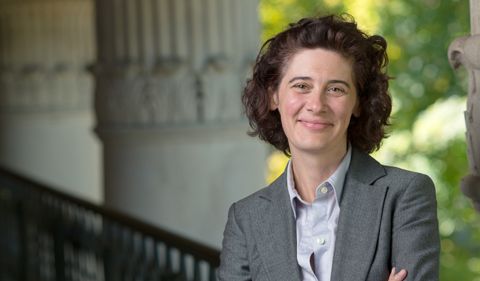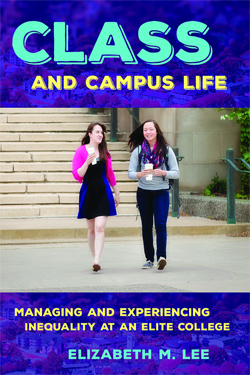
Dr. Elizabeth Lee
Dr. Elizabeth Lee, Assistant Professor of Sociology at Ohio University, recently discussed her “new book about class inequality at an elite university” with Inside Higher Ed’s Josh Logue in an article on “Class and Campus Life.”
 “Campus protests have triggered wide-ranging discussion and debate about race. And, because some of the most prominent protests have unfolded at universities like Yale, Princeton and Harvard Universities, those discussions have touched on the experience of minority students at elite, wealthy institutions. While class is often implicated in those debates, it is rarely the focus. Elizabeth Lee seeks to inject issues of class into campus discourse with her new book, Class and Campus Life: Managing and Experiencing Inequality at an Elite College(Cornell University Press). In it, she describes the experiences of students with lower socioeconomic status at a wealthy women’s college that she does not identify but refers to as Linden. The book illustrates a variety of ways in which class inequality influences students, the institution itself and the interplay between the two,” writes Logue.
“Campus protests have triggered wide-ranging discussion and debate about race. And, because some of the most prominent protests have unfolded at universities like Yale, Princeton and Harvard Universities, those discussions have touched on the experience of minority students at elite, wealthy institutions. While class is often implicated in those debates, it is rarely the focus. Elizabeth Lee seeks to inject issues of class into campus discourse with her new book, Class and Campus Life: Managing and Experiencing Inequality at an Elite College(Cornell University Press). In it, she describes the experiences of students with lower socioeconomic status at a wealthy women’s college that she does not identify but refers to as Linden. The book illustrates a variety of ways in which class inequality influences students, the institution itself and the interplay between the two,” writes Logue.
Here’s one question from the interview:
Q: The identity of the college where you spent two years researching this book is disguised, as are all the other names in the book, but you do describe it as “a selective women’s liberal arts college located in the Northeast” that is “elite” and “offers plenty of financial aid.” I wonder how many of the dynamics you observed are likely to be similar on different kinds of campuses — large publics, less wealthy privates, etc.?
A: I do think there are some differences — one prominent one being that at a large campus, there may be room for a wider variety of social niches and more anonymity. However, having spent time at institutions very different than the one I studied (the University of Pennsylvania, a large private campus in a city that’s also predominantly affluent students, where I went to grad school; and Ohio University, a large public campus in a small town that’s less markedly affluent but nonetheless majority non-first[-generation], where I now work) — I see some aspects that are similar.
One example that was a little surprising to me is the language around community. I talk in the book about the contrast between the image of college as community, or even family, while also feeling like an outsider. This was really prominent at Linden, which is a small campus, and it was something I thought might be quite different at a larger campus. However, Ohio University uses very similar language, and my students there talk about the very emotional expectations for college life — not only as the “best four years” but also of the friendships and close ties you’ll make there. That contradiction is frustrating for low-SES students: on the one hand, campus is shown as this inclusive community where people are forming lifelong friendships, but on the other hand you’re partially excluded. Some issues I write about are actually amplified at other campuses. For example, the ways in which students try to manage their social lives in a setting where most of their peers have more money than they do. Linden has a pretty campus-based social system. At a campus like Penn, by contrast, there are much more immediate ways to spend money because of the close proximity to Philly’s downtown, whether it’s dinner or clothes or nightclubs.



















Comments